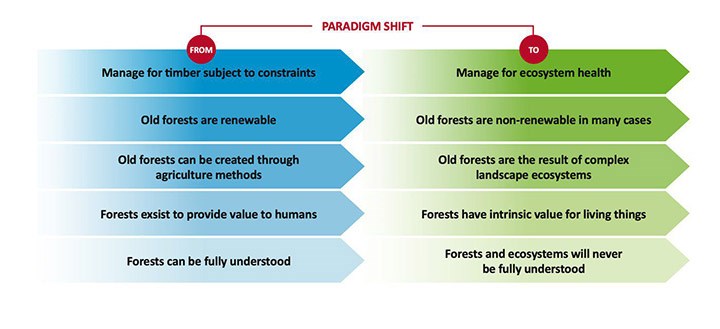John Horgan has committed an NDP government to enacting independent review recommendations calling for a ‘paradigm shift’ in old growth forest management, including legislation to make ecosystem health and biodiversity an overarching, all-sector priority.
The report, A New Future for Old Forests, was commissioned by the Province to engage British Columbians in a review of B.C.’s old growth strategy. It revealed a ‘paradigm shift’ in how society viewed the natural environment, and recommended forest management needed to adapt accordingly.
The report also called for full government-to-government engagement with Indigenous leaders in shaping and implementing old growth forest policy, and recommended a deferral on development in forests with high risk of irreversible biodiversity loss.
“We're committed to implementing the report in its totality,” said Horgan when asked about it during a campaign stop.
“That is surprising and excellent,” said Dr. Karen Price, an independent ecologist who co-authored BC's Old Growth Forest: A Last Stand for Biodiversity, a scientific assessment of the province’s old growth forests.
However, all the recommendations need to be fully implemented and based on science, otherwise it will be ‘business as usual,’ cautioned Price, who called the paradigm shift – putting ecosystem health and biodiversity first – a critical foundation.
“It’s pretty amazing, frankly, if it happens,” said professional forester Garry Merkel when told of Horgan’s public commitment.
Merkel and forester/consultant Al Gorley made up the two-person panel that conducted the old growth review.
“Our first recommendation was to pass overarching legislation... that commits us to shift our entire legislative and policy framework towards ecosystem health,” said Merkel.
Ecosystem health over timber
The panel reviewed thousands of reports, emails and presentations from people concerned about old growth. Many expressed doubts about how forests were being managed.
“Forestry has a bright future, but it has to be sustainable,” Horgan said. “And it has to recognize a whole host of values, not just as two by fours.”
Forestry management is currently built on timber as the core value.
“We need to shift our idea that we can manage for timber, subject to constraints,” said Merkel, a member of the Tahltan Nation in Northern B.C., “to manage for ecosystem health, with timber as one of the many benefits that we get from having healthy ecosystems.”
People also need to alter the perception that all forests are renewable and can be recreated through agricultural means, because some can’t, Merkel said.
“Many of our old forests live on ecosystems that are maybe 10 times older than the forest and it's the ecosystems that sustain the old trees,” said Merkel. “We have this idea that we can manage and create old forests through agriculture methods because they're like crops, (but) old forests are the result of very complex landscape ecosystems.”
Intrinsic value
Old forests hold intrinsic worth for many living things and we will never fully understand them, Merkel said.
“Many of the old growth stands on Vancouver Island are worth way more standing up than they are on the back of a truck,” said Horgan, who grew up on the island. “And certainly worth way more than they would be ground into pellets.”
According to the province, 23 per cent of B.C.’s estimated 50 million hectares of forests are old growth. Only one per cent of that is productive old growth, said Price. “This is the kind of stuff that people think of as old growth.”
Old growth is loosely defined as 250 years old on the coast and 140 years old in the Interior, with trees growing 15 metres over 50 years considered moderately productive, and trees reaching 20 metres or more, highly productive.
The review panel found near universal support for preserving the oldest, most productive old growth. Some people supported a moratorium on old growth logging, whereas others were concerned about reductions in harvestable land and access to ongoing timber.
“We had people crying in front of us because this is all they know,” Merkel said. “I feel for them hugely.”
Many of the recommendations were designed to enable the paradigm shift, such as land use planning grounded deeper in communities, he said.
“It doesn't happen overnight,” said Merkel. “Everybody has to grow at their own pace.”
Given the ambitious scale of the task – altering the mindset of a society and a massive, intergenerational industry – transcending the four-year political management cycle would be monumental.
“That would be amazing if a government would actually do that,” Merkel said.



